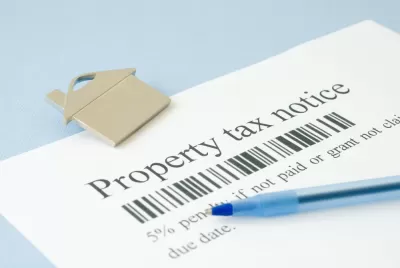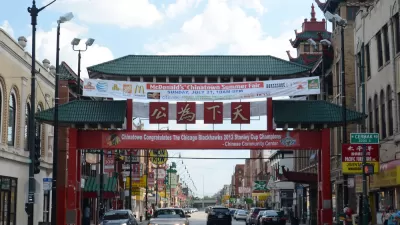Between biased property appraisals that undervalue Black-owned properties and biased tax assessments that levy an unfair burden, homeowners of color are flanked by a double-whammy of racism.

Homeownership is widely recognized as a cornerstone of the American dream, especially as a more or less guaranteed ticket to wealth accumulation over time. Despite this hallowed reputation, however, real estate is anything but a level playing field; and while the overt racism of federally sanctioned redlining may be an increasingly distant memory, the deck is still systematically stacked against Black, Indigenous, and people of color (BIPOC) owners ever realizing the true value of their properties. Why? In part, because the very professionals and systems tasked with determining that value—namely those focused on property appraisals (for loan and mortgage purposes) and assessments (for property taxation)—contribute to the problem.
Appraisal Bias
The role of private appraisers in stifling wealth accumulation among minority homeowners is relatively straightforward: an unrealistically low appraisal curtails an owner’s ability to obtain a mortgage or home equity loan, and ensures they receive less than they should at the point of sale. The reasons appraisers undervalue minority-owned properties are many, and include a lack of familiarity with the neighborhoods in which they are working, as well as insufficient professional training and expertise. Research published by Freddie Mac in 2021 found that 12.5 percent of the properties in majority-Black census tracts and 15.4 percent of properties in majority-Latino census tracts received an appraisal value lower than the contract price, compared to just 7.4 percent of the properties in White census tracts. This demonstrates an “appraisal gap” of 5.2 percent—meaning that homes in majority Black census tracts were much more likely to be appraised at less than the contract price.
It’s perhaps logical to assume that if these owners suffer in some ways as a result of lowball valuations, they should also see financial benefits in the form of property tax savings. After all (ignoring the effects of intervening policies like homestead exemptions and tax abatements), property tax bills are the result of applying a uniform tax rate to the value of an owner’s parcel, and the lower that value, the lower the resulting bill. Yet while the assumed relationship between property values and tax bill size holds, the seemingly logical conclusion—that the same households that suffer from low appraisals will benefit through lower taxes—does not. In fact, a number of recent academic studies have shown that minority and low-income property owners pay proportionately more in property taxes than their whiter, wealthier counterparts.
The equity implications of these dual realities are stark. And if we are to move toward creating a real estate market in which all participants receive financial benefits commensurate with their participation, it’s imperative that we understand how the inequities are introduced and what can be done to correct them.
Considerable good work has been done to understand the causes and combat the effects of appraisal bias. In June 2021, the Biden administration called on the Department of Housing and Urban Development to create a Task Force on Property Appraisal and Valuation Equity, charged with addressing inequities in home appraisals. In January of this year, the National Fair Housing Alliance released an 84-page, federally funded report that contains a thorough exploration of the sources of bias in appraisals and makes a series of practical recommendations for beginning to address what it describes as “one of the key drivers of today’s wealth gap.” And state and federal policymakers are similarly becoming engaged in combating this form of valuation bias.
Biased Assessments
Like appraisal bias, bias in assessments has also garnered media attention. Cities from Chicago and Detroit have made headlines for their inequitable, and sometimes downright indefensible, valuations. In Philadelphia, a 2018 investigation revealed that homes that sold for between $25,000 and $50,000—many of which were in communities of color—were assessed 70 percent higher than they should have been, inflating the tax bill for a $37,500 home by about $360 annually. Meanwhile, homes that sold for between $1 million and $2 million were assessed at nearly 11 percent below their actual value, resulting in tax bills that were $2,000 less than they should have been.
And academic researchers . . .
FULL STORY: How Tax Assessments are Racist

Planetizen Federal Action Tracker
A weekly monitor of how Trump’s orders and actions are impacting planners and planning in America.

Maui's Vacation Rental Debate Turns Ugly
Verbal attacks, misinformation campaigns and fistfights plague a high-stakes debate to convert thousands of vacation rentals into long-term housing.

Restaurant Patios Were a Pandemic Win — Why Were They so Hard to Keep?
Social distancing requirements and changes in travel patterns prompted cities to pilot new uses for street and sidewalk space. Then it got complicated.

In California Battle of Housing vs. Environment, Housing Just Won
A new state law significantly limits the power of CEQA, an environmental review law that served as a powerful tool for blocking new development.

Boulder Eliminates Parking Minimums Citywide
Officials estimate the cost of building a single underground parking space at up to $100,000.

Orange County, Florida Adopts Largest US “Sprawl Repair” Code
The ‘Orange Code’ seeks to rectify decades of sprawl-inducing, car-oriented development.
Urban Design for Planners 1: Software Tools
This six-course series explores essential urban design concepts using open source software and equips planners with the tools they need to participate fully in the urban design process.
Planning for Universal Design
Learn the tools for implementing Universal Design in planning regulations.
Heyer Gruel & Associates PA
JM Goldson LLC
Custer County Colorado
City of Camden Redevelopment Agency
City of Astoria
Transportation Research & Education Center (TREC) at Portland State University
Jefferson Parish Government
Camden Redevelopment Agency
City of Claremont





























